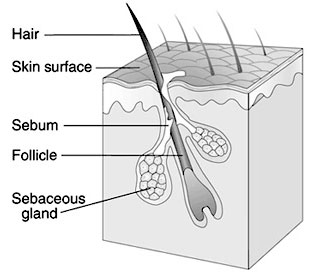You may be surprised to discover that dermatologists are hair experts. The hair is actually a component of skin and therefore a natural item for a dermatologist to handle.
Hair Anatomy
 The base of each hair follicle is found below the skin, in the subcutaneous fat. There are millions of hair follicles all over your body. The hair follicle has many different associated parts – including the hair shaft and bulb, blood vessels, oil glands, muscles and nerves. The hair shaft itself is made of a protein known as keratin. The keratin contains natural pigments that give hair its individual colour. ‘Goose bumps’ are caused by the muscles contracting near each of the hair follicles. Hair is naturally conditioned by ‘sebum’ or oil from its sebaceous gland. As you age, your body produces less of this oil.
The base of each hair follicle is found below the skin, in the subcutaneous fat. There are millions of hair follicles all over your body. The hair follicle has many different associated parts – including the hair shaft and bulb, blood vessels, oil glands, muscles and nerves. The hair shaft itself is made of a protein known as keratin. The keratin contains natural pigments that give hair its individual colour. ‘Goose bumps’ are caused by the muscles contracting near each of the hair follicles. Hair is naturally conditioned by ‘sebum’ or oil from its sebaceous gland. As you age, your body produces less of this oil.
The Life of Hair
Hair follicle cells are one of the fastest dividing cells in the human body. This is why your hair can grow up to 15cm in a single year. Some animals moult their hair in the warmer months. There is no seasonal pattern of shedding or growth of hair in humans. Instead of this pattern, our hair randomly passes through three phases:
- Catagen – This is the resting stage of hair and accounts for about 3% of all hair at any time;
- Anagen – This is the active phase of your hair and is when the hair is growing via cellular division. This is a phase that lasts for two to six years and accounts for the bulk of the hair at any time; and-
- Telogen – This is the shedding stage and accounts for roughly 15% of all hair at any time. You lose around 100 hairs in the Telogen phase each day.
Problems with Hair
Unfortunately, some people experience unexpected hair loss. This can be very distressing, depending on the type and extent. Females tend to find that they feel more stigmatised and are often more distressed by their alopecia than men (especially androgenetic alopecia). Hair loss is classified as either scarring or non-scarring. Causes of loss may be related to the integrity of the hair shaft itself, infection, specific diseases of the skin, hair care practices, abnormal hormones, or an abnormal sensitivity of hair receptors to a normal level of hormones, auto-immune diseases, low iron levels, abnormal thyroid function and medications. There may also be an association with general health, stress and even pregnancy.
If you have any questions or concerns about hair or hair loss contact your local doctor, who will arrange for you to see a dermatologist. Contact us today.



